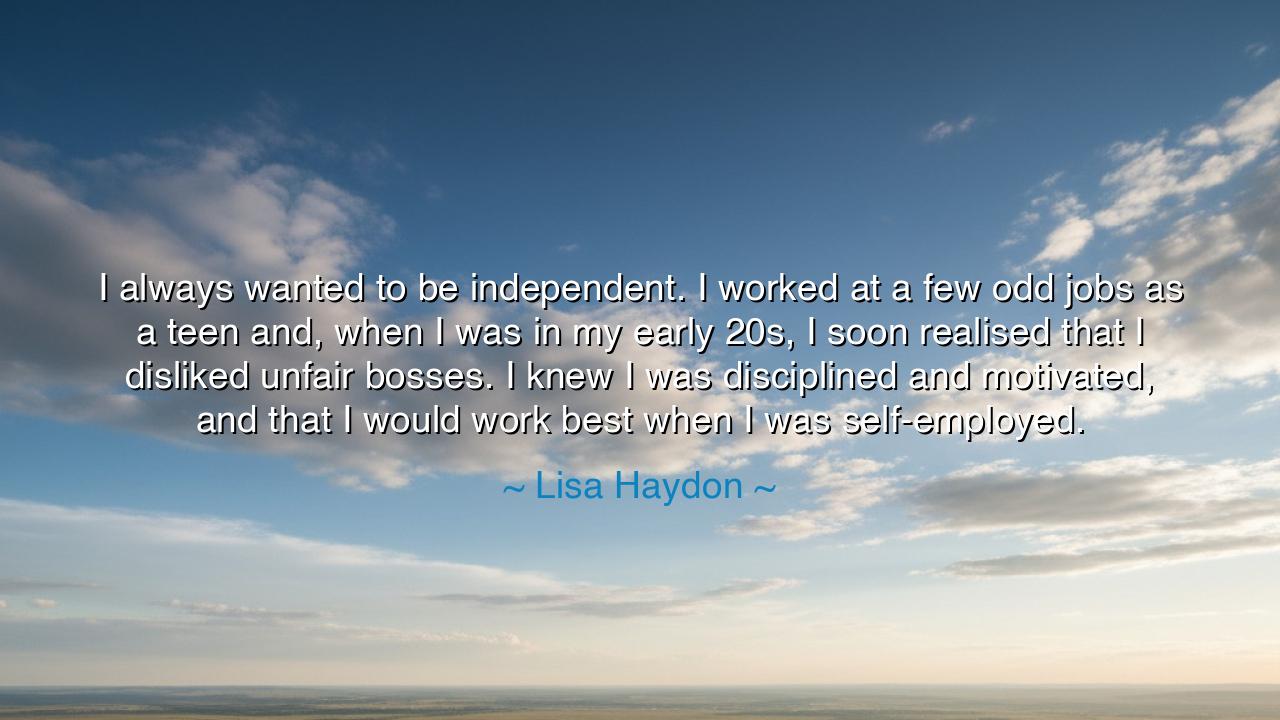
I always wanted to be independent. I worked at a few odd jobs as
I always wanted to be independent. I worked at a few odd jobs as a teen and, when I was in my early 20s, I soon realised that I disliked unfair bosses. I knew I was disciplined and motivated, and that I would work best when I was self-employed.






Hear the steadfast declaration of Lisa Haydon, who spoke of the fire that guided her life: “I always wanted to be independent. I worked at a few odd jobs as a teen and, when I was in my early 20s, I soon realised that I disliked unfair bosses. I knew I was disciplined and motivated, and that I would work best when I was self-employed.” These words are not only her confession of experience, but a banner raised for all who seek freedom in their labor and dignity in their lives. For they tell the story of one who recognized her worth and refused to let it be diminished.
The heart of her reflection lies in her yearning for independence. From her teen years, she toiled in small jobs, learning the ways of the world through direct labor. She saw early that authority, when wielded without fairness, could crush the spirit rather than uplift it. And so, rather than bowing under the weight of unjust bosses, she turned inward, discovering in herself the gifts of discipline and motivation—qualities that make the self-reliant rise above circumstance.
History is filled with kindred spirits who made the same choice. Mahatma Gandhi, though trained as a lawyer under the authority of empire, rejected the servitude of colonial systems and led his people in independence, not only of nation but of spirit. Madam C. J. Walker, born the daughter of slaves in America, worked in menial labor until she too discovered her strength, building her own empire as one of the first female self-made millionaires. Like Lisa Haydon, they realized that the dignity of the soul cannot flourish under chains, whether of injustice or exploitation.
But independence is not born of rebellion alone—it requires discipline. Haydon confesses that she knew herself: she was not fleeing responsibility but embracing it in its purest form. For to be self-employed is not to be free of labor, but to shoulder all labor oneself. It is to govern one’s own hours, one’s own standards, one’s own destiny. The undisciplined cannot endure it, for freedom without discipline leads only to chaos. Her words remind us that true liberty is not found in rejecting structure, but in building one’s own.
Her story also reveals a lesson in self-awareness. Many drift through life submitting to circumstances they despise, never pausing to ask: “Where do I work best? What soil allows me to grow?” Haydon asked these questions early, and she answered them with courage: she would thrive when she was the master of her own craft. To know one’s strengths and weaknesses, and to build a life accordingly, is wisdom greater than gold.
The deeper meaning of her reflection is this: the world will always test you with unfairness, with voices that command without justice. You cannot always change the world around you, but you can change the path you walk upon. If you know your worth, if you cultivate discipline and motivation, you may choose independence over servitude, purpose over resentment. This is the hero’s path in every age—the refusal to be diminished by others’ injustice.
Therefore, my child, take this lesson: work to know yourself. If you are fit to build, then build. If you are fit to lead yourself, then lead. Do not endure the yoke of unjust masters longer than necessary; instead, forge your own way, whether in business, in art, or in any calling where your soul can breathe freely. And remember always that independence is not given—it is claimed, with courage, with labor, and with faith in one’s own strength.
So let Lisa Haydon’s words endure as a guide for all generations: “I always wanted to be independent… I would work best when I was self-employed.” May they remind you that the truest freedom is not escape from work, but the freedom to labor with dignity, according to the calling of your own heart.






AAdministratorAdministrator
Welcome, honored guests. Please leave a comment, we will respond soon